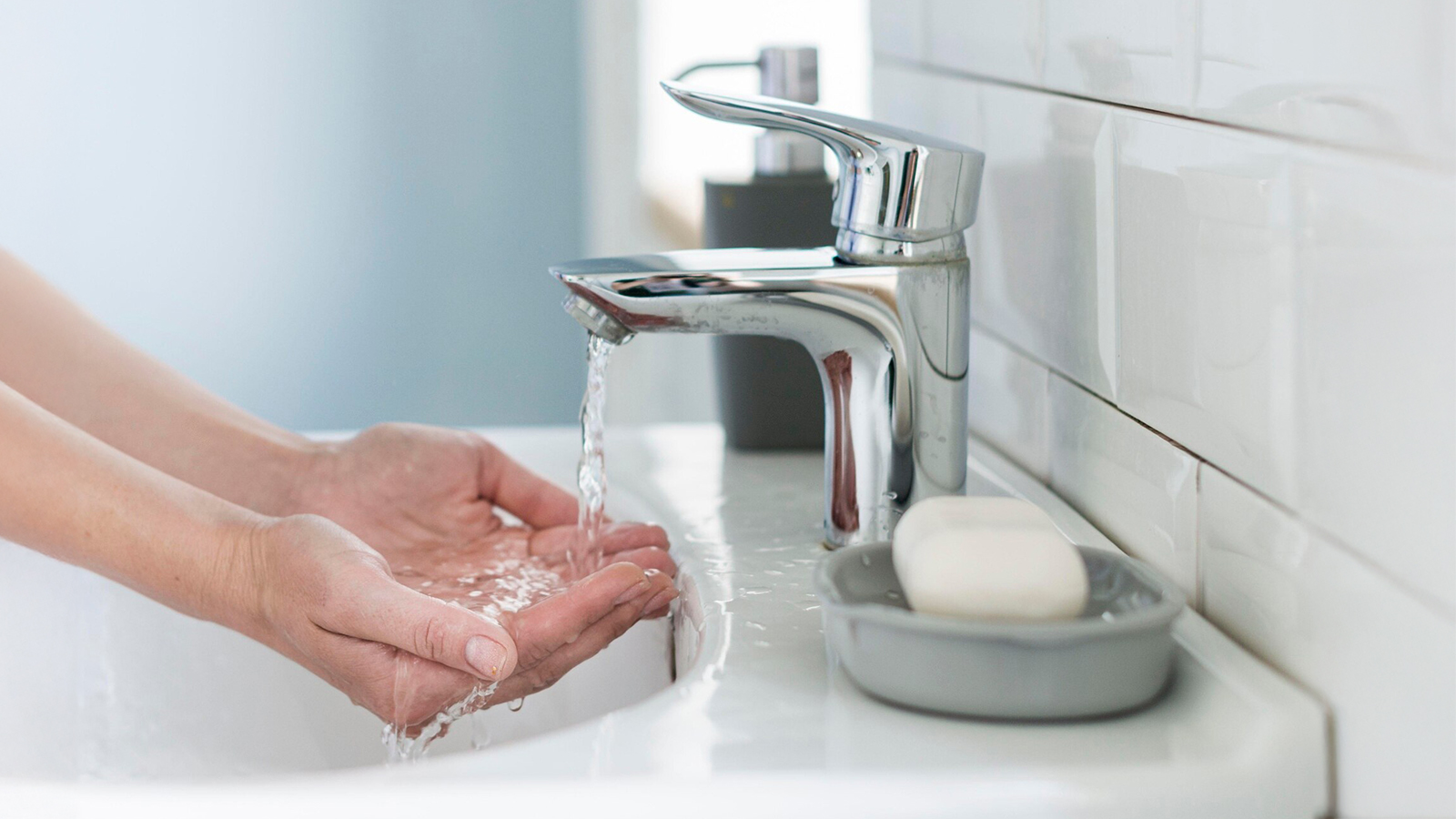Your cart is currently empty!
How can I save water at home?

A typical UK household pays £448 a year for their water, and this will rise by an average of 21% over the next five years for those in England and Wales.
At Watergate, we’re passionate about saving your pocket as well as the planet. So here are our ten top tips to reduce your water consumption, your bill and your carbon footprint too.
1. Shower smart
According to the biggest-ever review of UK water use, showering is the number one culprit in high water bills.
The thought of getting in from a run in the pouring rain, peeling off your soaked layers and rushing your way through a three-minute shower is enough to put anyone off the idea of water conservation (and exercise for that matter). But did you know that cutting just thirty seconds off your shower can save you £120 a year for a family of four? Plus, if you can keep your shower to no longer than 60 seconds, you could reduce your water usage to under ten litres (2.1 gallons).
Fitting a low-flow head on your shower will produce similar results, and many happy users report that they can’t even tell the difference. One thing you definitely will notice is the extra spending money in your pocket at the end of the year!
If that sounds appealing, why not give some of these extra shower-saving tips a try?
- Time your shower – use a water-saving timer that lets you know when you’ve exceeded 35 litres of water. Many water providers will give away products like this for free, it’s worth checking with yours today.
- Don’t leave your shower running – make sure you jump in as soon as possible to maximise your water usage. If you can, keep your shower’s temperature gauge at the perfect temperature to avoid wasting time getting it just right.
- Adjust your shower power – try having a shower on a lower power setting to save water without cutting shower time!
- Turn your shower off when you’re soaping up. If you’re really serious about saving, “Army showering” – turning off the water while you shampoo or wash your body – saves five times more than cutting off that thirty seconds.
2. Tea for two?
Then make sure that’s all you put into the kettle. Two thirds of people boil more water than they need to every time they make a cup of tea or coffee. This water saving tip will cut your electricity costs too, so you can feel twice as nice about your eco efforts!
3. Turn the water off while brushing your teeth
The soothing sound of running water… or is it your wallet emptying? Leave the tap off while you brush your teeth and save £37 a year for a family of four according to economist Cebr. It’s great for the environment too.
4. Only run full loads
Surprisingly, (and thankfully for those of you who hate housework!), using the dishwasher actually works out more efficient than washing those dirty dishes by hand. Dishwashers are extremely effective at doing what they were made to do, and you probably can’t beat them at their job. What you can do, though, is only use them when they are full. If you scrape the plates well, you can cut out the rinse in the sink, too, saving even more water and money!
Washing machines use a lot of water. Don’t worry, we aren’t suggesting you dig out the washboard and mangle, but running only full loads and following a few of the tips below could result in a big reduction in your water usage.
- Re-use Towels. Hotels didn’t bring in this initiative because they’re lazy; it is a genuinely easy way to save on water usage. The towel you use to dry after a shower does not need to be laundered after each use, so hang it up and re-use it instead. It will save you time, too – you can thank us later.
- Use Size Cycles. When you need to run a small load for some reason, take advantage of the washer’s “small load” setting, which will use less water and electricity.
- Skip the Extra Rinse. Or run your machine on eco mode. Many washing machines have an option for an extra rinse cycle, so skip this step to save water.
- Upgrade to an Efficient Washing Machine. When your existing machine breaks, opt for an efficient machine to replace it. High-efficiency washing machines can use up to 30% less water than other machines. They can also use up to 50% less electricity. So, while you may spend more initially in buying an energy-efficient machine, you’ll certainly save money on bills in the long run.
5. Fill a jug with tap water and place in your fridge
Next time you want a refreshing, cool drink, you won’t have to run the water for several minutes first to make sure it’s cold. Just pour, sip, and feel those smug eco warrior vibes soak through you.
6. Get a water butt
Is now a bad time to remind you that it rains a lot in the UK? Think about fitting a water butt to collect rainwater off your roof. Water butts usually store about 200 litres of water. As well as being better for watering your plants (rainwater is actually better for your garden than the water from your tap), using rainwater in the garden reduces the amount of treated water you use. Here are some other great ideas for ways you can use collected rainwater.
- Cleaning garden pots and planters
- Watering indoor plants and herbs
- Filling up garden ponds and water features
- Washing the car
- Washing windows
- Cleaning garden tools and equipment
- Washing lawn and patio furniture
7. Fit a water-saving toilet
Toilet flushing accounts for ⅓ of water used in the home today. If you have an older toilet, it probably uses around 14 litres of water per flush, but newer dual flush systems use as little as 2.6 litres per flush. That’s quite a saving. Don’t fancy renovating? You can buy a cistern displacement device (or often get one free from your water supplier) to fit in your toilet – or you can create your own by simply filling an empty plastic bottle with water and placing it inside your toilet cistern. Doing this will save you 3-4 litres per flush. Think about how many times you use the toilet in a day – those litres add up pretty quickly!
Another great trick you can try is putting a few drops of food colouring in your cistern and waiting 10 minutes to see if it spreads to the bowl. If it does, hey presto – you have a leak. Make sure to flush after 10 minutes though, or you might stain the tank!
8. Bathtime fun
Showers use much less water than baths, but there’s nothing quite like a big bubble bath to take away the stresses of the day (or a bath full of rubber ducks to entertain the little ones!). If you want to ‘splash out’ on a bath, then consider buying a babydam, a device that sections off the bath to make it smaller for the kids. For older kids, why not try a “bath buoy” – it saves as much as 30 litres per bath, and doubles up as a footrest for those of you who are too mature to play with penguins (who are you trying to kid!).
9. Water early or late
If you’re a green-thumbed gardener you’ll know well-kept foliage means lots and lots of water. Thankfully plenty of it falls from the sky in the United Kingdom, but if you are going to run those sprinklers then consider doing it early in the morning or late at night. Less water will evaporate, meaning your lawn stays greener for longer, and you’ll be greener too. Win, win. Even better, use a watering can, and you can fill it from that shiny new water butt you fitted!
10. Fix those leaks
A leaky tap or a leaky toilet is ‘money down the drain’, quite literally. Even a slowly dripping tap can waste thousands of litres of water a year. A leaky toilet can waste as much as 2,000 litres… a day! Try Drinktap’s handy drip calculator to see how much you can save – it can really add up. Smart leak detectors like Sonic from Watergate will look for those leaks and stop them when they happen by turning the water off. They also give you valuable information about your everyday water usage so you can take action where needed. According to the Energy Saving Trust, people who have a way to keep tabs on their water usage tend to save 3 – 10% on their water bills straight away – and that’s before you consider what hidden water leaks might be costing you.
